Inside the Canaveralejo, Cali, Colombia, the tension is palpable. Deep, calculated breaths are taken by the men entering the ring, whilst their ‘opponents’ gasp for whatever air remains in a far less controlled fashion. The aim here in Valle del Cauca was to evade the brutal, unrelenting attacks of the larger competitor, whilst entertaining the enormous crowd with colourful, sequinned outfits and Capote de Brega. Bullfighting had been part of their culture, though dangerous and often times graphically violent.
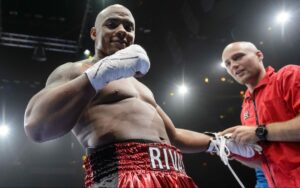
Muscle bound and broad in stature, heavyweight boxer Oscar Rivas (26-0, 18KOs) was preparing for his own date with destiny, in a ring far smaller and more intimate. Both men, vying for public affection on July 20th, shall take no backwards step, as the hunt for world titles continues upon the sport’s fragmented heavyweight landscape.
Rivas, known as ‘Kaboom’ for his explosive power, faces off against Brixton’s recent pay-per-view revelation, Dillian Whyte (25-1, 18KOs) – both fighters possessing an almost identical résumé. Slipping and sliding wasn’t exactly either man’s raison d’être. Locking horns seemed far more plausible.
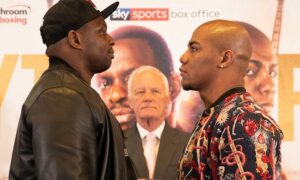
Before he steps on the plane, travelling to London for the showdown at the O2 Arena, Rivas opened up over his time in Colombia when speaking through translated answers. His city had been known as the Sporting City of Colombia, with basketball, football and bullfighting specifically, capturing the public’s attention. The product of hard working parents, struggling on the breadline, he explained life in the suburbs of one of South America’s most dangerous cities.
“My childhood was very hard. I grew up in poverty with very few opportunities, but I always liked the hard work. As a child, I worked very hard in many different jobs in my city, Cali. I had to work on the construction sites, also washing cars in the street and I also collected garbage to be able to take money to my house. There was also a lot of violence at that time and my plan was to survive every day with my family, but I never liked to get involved in evil activity, [I was] always good.”
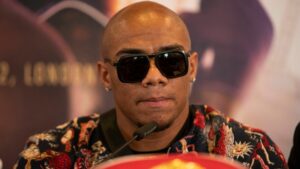
The nation which birthed footballing stars such as the infamously bushy-haired Carlos Valderrama and the erratic, scorpion kicking goalkeeper René Higuita had almost captured Rivas, surrendering himself to soccer from a young age. The emergence of boxing and the potential to earn money independently for his family, however, saw him transition to a sport where he only had to rely on his own performance, taking the bull by the horns, so to speak.
“The first time I tried boxing, I just wanted to do something different to football because before being a boxer, as an eleven-year old, I liked soccer. I decided I would be better [off with] boxing, because I wanted to help my family and from the first moment that I entered a boxing gym, I knew this was my sport.
“I have been training now for twenty years, but in Colombia, there have been many great boxers before me. The one that I can say I admire most is Kid Pambele – the first Colombian [world] champion. I can tell you, my boxing idol was always Roy Jones Jr.”
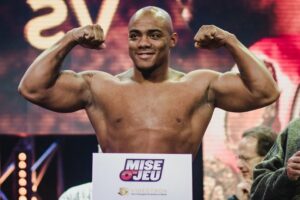
Not immediately comparable with the slick, elusive American great, thirty-two year old Rivas wasn’t alone in being drawn to boxing after watching Jones Jr dazzle throughout the nineties. Kid Pambele, officially named Antonio Cervantes, had been an inspiration to the current crop of Colombian fighters after winning their inaugural world title in the early seventies, with old clippings and anecdotes shared throughout households in Bolivar and beyond. Inducted into the International Boxing Hall of Fame, Cervantes opened the door for Colombian boxers such as Edison Miranda or Eleider Alvarez.
Rivas dreamed of matching the achievements of his friend ‘Storm’ Alvarez, who briefly held the WBO world light-heavyweight title, before losing it in a rematch with Sergey Kovalev. The countrymen could be seen on social media, spending time with one another from their base in Canada. The pair had secretly flown to Montreal and signed professional papers with GYM (Groupé Yvon Michele), after impressing at the Beijing Olympics where Oscar had toppled established world-ranked heavyweight, Kubrat Pulev. Now under the tutelage of Marc Ramsay, he was prepared to tackle Dillian Whyte in a quest for world honours.
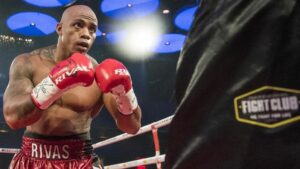
“I have been living in Canada for ten years now. I started training two months ago to be in my best sports form and I have a very good coach. We will travel to Colombia to train in Bogota, to be in even better shape for July 20th. I’m preparing for twelve rounds because I know that the fight is not going to be easy and I have to give my best in this fight, because I know Whyte wants to beat me and I want to beat him.”
He added, “I didn’t have to change anything [in camp], just keep working very hard as I always do and remain more concentrated in the gym to be in optimal condition. This is what makes me most happy – to make myself known in the world of a sport that I love and also in a city like London. It fills me with great satisfaction.”
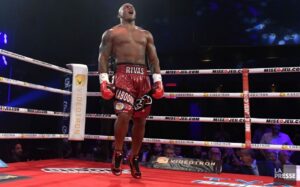
From rewatching his most recent success, a twelfth round knockout of solid, well-travelled contender Bryant Jennings, it was evident that the physically impressive victor had enough in the tank to trouble ‘The Body Snatcher’ on domestic soil. Springing into action, releasing his own thudding body shots throughout the contest, he’d worn down a fighter who had previously earned plaudits when challenging Wladimir Klitschko.
Although Rivas was an unknown quantity, his amateur pedigree and conditioning couldn’t be overlooked. He wasn’t coming to London to make up the numbers, that much was certain.
After a trio of almost meaningful fights at the top of the division featuring Anthony Joshua, Deontay Wilder and Tyson Fury (all facing seemingly overmatched opposition), the Whyte v Rivas card was set to close the summer, potentially deciding an opponent for either the unified champion or the Gypsy King. Truth be told, it could be the best of the bunch, with both men in the form of their careers and entering their prime as heavyweight fighters. The difficulties faced by Canadian promoters when building events had meant Rivas would take flight – but it was nothing new to him.
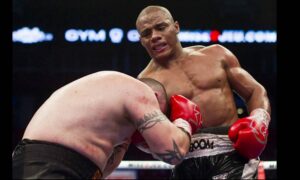
Of his intended opponent, he added, “Dillian Whyte as a boxer? You have to be very careful and be aware of his skills, but you also have to work hard with him and know that he has much more scope, in height and range. So you have to know how to move very well in the ring [to overcome those advantages].”
Currently ranked in the top ten of each governing body and as high as fourth by the WBO, his bout with Britain’s Whyte could be seen as a final eliminator, with talks of an interim WBC title yet to be confirmed after frequent lobbying from Matchroom’s Eddie Hearn – a result of Whyte’s number one status with the governing body for over five hundred days.
Fighting the taller, longer and heavier London man was risky for the visitor as they both approached world title contention, yet rolling the dice, so often avoided by over cautious promoters or managers within boxing, was exactly what the pair had intended on. For that, they’d earned one another’s respect.
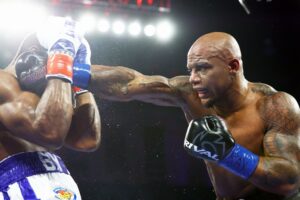
Oscar Rivas shall take to the O2 in front of thousands of British fans, determined to continue on a journey to the top of the division. It was a sport he’d taken up initially to earn money for his family, struggling to make ends meet in Cali, Colombia. In reality, he was perhaps a fight away from the greatest prize in sport – the heavyweight championship of the world. Despite his detractors, he retained complete belief in his ability and welcomed the challenge, a credit to the Colombian champions that had come before him.
When touching down, over five and a half thousand miles from the streets where he once collected garbage, it would be Rivas’ moment to announce himself. The cauldron of noise that awaits him shall seem familiar, from his time watching man versus mammal in the Canaveralejo all those years ago. On this occasion, there’d be less room for manoeuvre and no glistening distractions as the Colombian prepares to make history. He was undoubtedly the bull, as opposed to the matador.
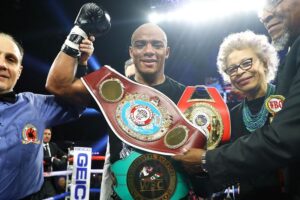
“Well, in Colombia it was very hard [to succeed] because I had no support from anybody and I wanted to get ahead for my family. I had to work to pay for my equipment and then go to training, so at the beginning it was very hard, but I wanted to follow my dreams in boxing.
“I have never stopped following that dream of being a great fighter. I would be the first super-heavyweight from Colombia to achieve that [world title] and I want to be number one, that’s why I work as hard as I can, while I can still do it.”
Interview written by: Craig Scott
Follow Craig on Twitter at: @craigscott209